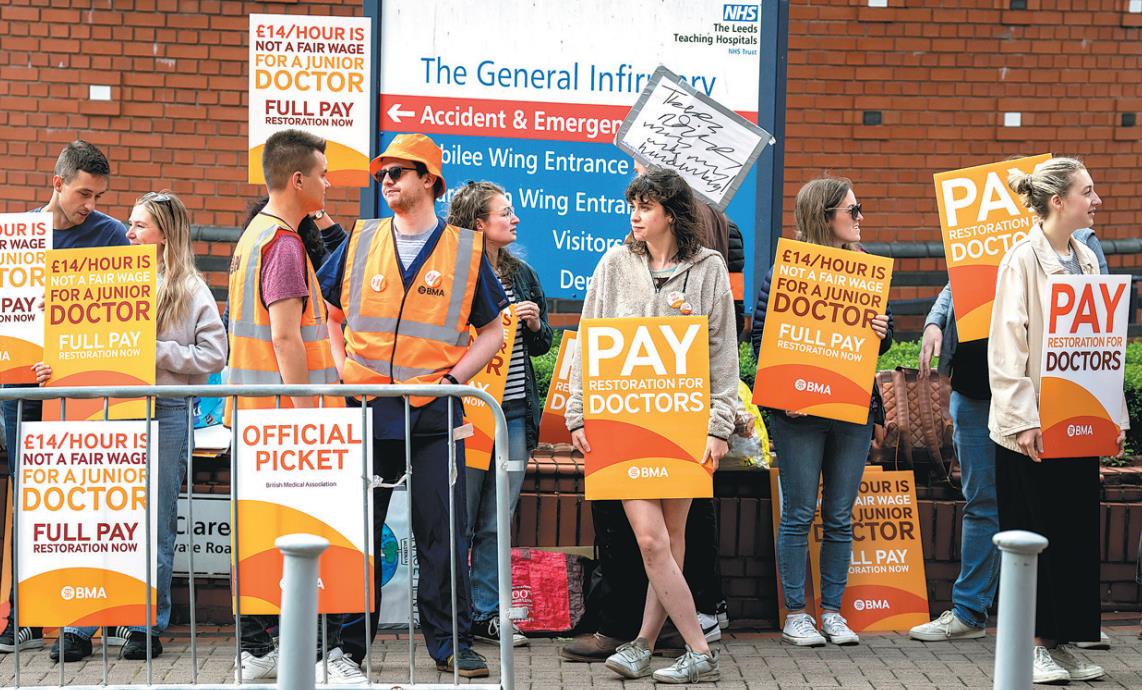Health service shows its age as it turns 75
By Julian Shea in London | China Daily Global | Updated: 2023-07-17 07:19
Editor's note: As Britain's National Health Service marks 75 years of existence, China Daily takes a look at its history, its practices and the tough challenges it faces.

Pressure on resources pushes revered UK's national treasure to breaking point
Few opportunities or responsibilities are given to a city as big as hosting the Olympic Games.
With much of the world watching, and waiting four years for the big event, the pressure on a host to get things right is enormous — but it is also a once-in-a-generation opportunity to showcase the country, how it sees itself and what it is proud of.
At the opening ceremony for the Games in London in 2012 Britain produced a dazzling piece of imaginative, witty and self-deprecating public theater, highlighting elements of its national story such as the Industrial Revolution, its rich tradition of children's literature, cutting-edge pop culture — and, no doubt to the bemusement of many of the hundreds of millions around the world watching, the National Health Service, or NHS.
The inclusion of a dance sequence inspired by a national healthcare provider in such a spectacle may have seemed bizarre to many, but it demonstrated the importance of the cradle-to-the-grave, free-at-the-point-of-use system, and its centrality to the British national identity.
The foundational document of the NHS on July 5, 1948, said: "It will provide you with all medical, dental and nursing care. Everyone — rich or poor, man, woman or child — can use it or any part of it. There are no charges, except for a few special items. There are no insurance qualifications. But it is not a 'charity'. You are all paying for it, mainly as taxpayers, and it will relieve your money worries in time of illness."
Just to underline the national reverence for the NHS, its 75th anniversary was marked with a commemorative service at Westminster Abbey, the setting for the funeral of Queen Elizabeth and the coronation of King Charles. The abbey also provided one of the most infamous images of the European Union referendum campaign of 2016: Boris Johnson standing in front of a bus bearing a slogan about sending money to the NHS rather than to Brussels as if that were the ultimate act of goodness. Seven years later it has yet to be fulfilled.
The NHS is treated like a revered, aging family member, but as it passes such a significant milestone, the health of the healthcare system is causing more concern than ever, and its condition is critical.
Booking an appointment to see a doctor at a local surgery has become increasingly difficult, putting many people off even trying. During the pandemic, services were put to the test as never before, and long-running disputes over funding and pay for staff have led to services being overstretched with morale reaching rock bottom, culminating in bouts of strike action involving paramedics, junior doctors and nurses.
To more commercially minded people the reliance of so many people on a free-at-the-point-of-use service means a huge moneymaking opportunity is going begging. The specter of future NHS privatization haunts the British public like the third ghost in A Christmas Carol by Charles Dickens.
The British government has become increasingly obsessed with reducing immigration. According to figures published by Parliament last year, about 16.5 percent of NHS staff are non-British, with more than 200 nationalities represented in the workforce — another red rag to some politicians.
Reliance on overseas staff is nothing new. In 1961 the president of the General Medical Council, Henry Cohen, told the House of Lords: "The Health Service would have collapsed if it had not been for the enormous influx from junior doctors from such countries as India and Pakistan."
Writing in the BMJ, the British medical journal, on the NHS's 75th birthday, David Oliver, an NHS doctor of 34 years, said the service faced "an existential crisis as bad as at any time since (it) was founded".
"We have more than 7 million people on waiting lists for elective care, millions more probably missing from them, and the worst waiting times for decades.
"We have among the fewest hospital and intensive care beds per capita in the OECD, hospitals routinely running at full and unsafe bed occupancy, handover delays, overcrowding in acute care, and many acute beds occupied by people fit to leave but waiting for community services that don't have the capacity, funding or staff."
Without immediate action, he said, the NHS is unlikely to be around to celebrate its 85th birthday.
In the Health and Social Care Act of 2012, introduced by the coalition government on the watch of the then-health secretary Andrew Lansley, choice and competition were promoted in importance as a way the NHS should be run, which critics would say opened the door to the privatization of services.
In June last year, a study by the University of Oxford published in the Lancet Public Health journal said, "The privatization of the NHS in England, through the outsourcing of services to for-profit companies consistently increased (after 2012)."
This came at the highest price possible, the study said. "Private-sector outsourcing corresponded with significantly increased rates of treatable mortality, potentially as a result of a decline in the quality of healthcare services."
A report published by the healthcare charity the King's Fund in April said the NHS had "declined since 2010, as a result of much lower funding increases, limited funds for capital investment and neglect of workforce planning".
However, in an interview with Sky News, Health Secretary Steve Barclay defended the government's handling of the NHS.
























